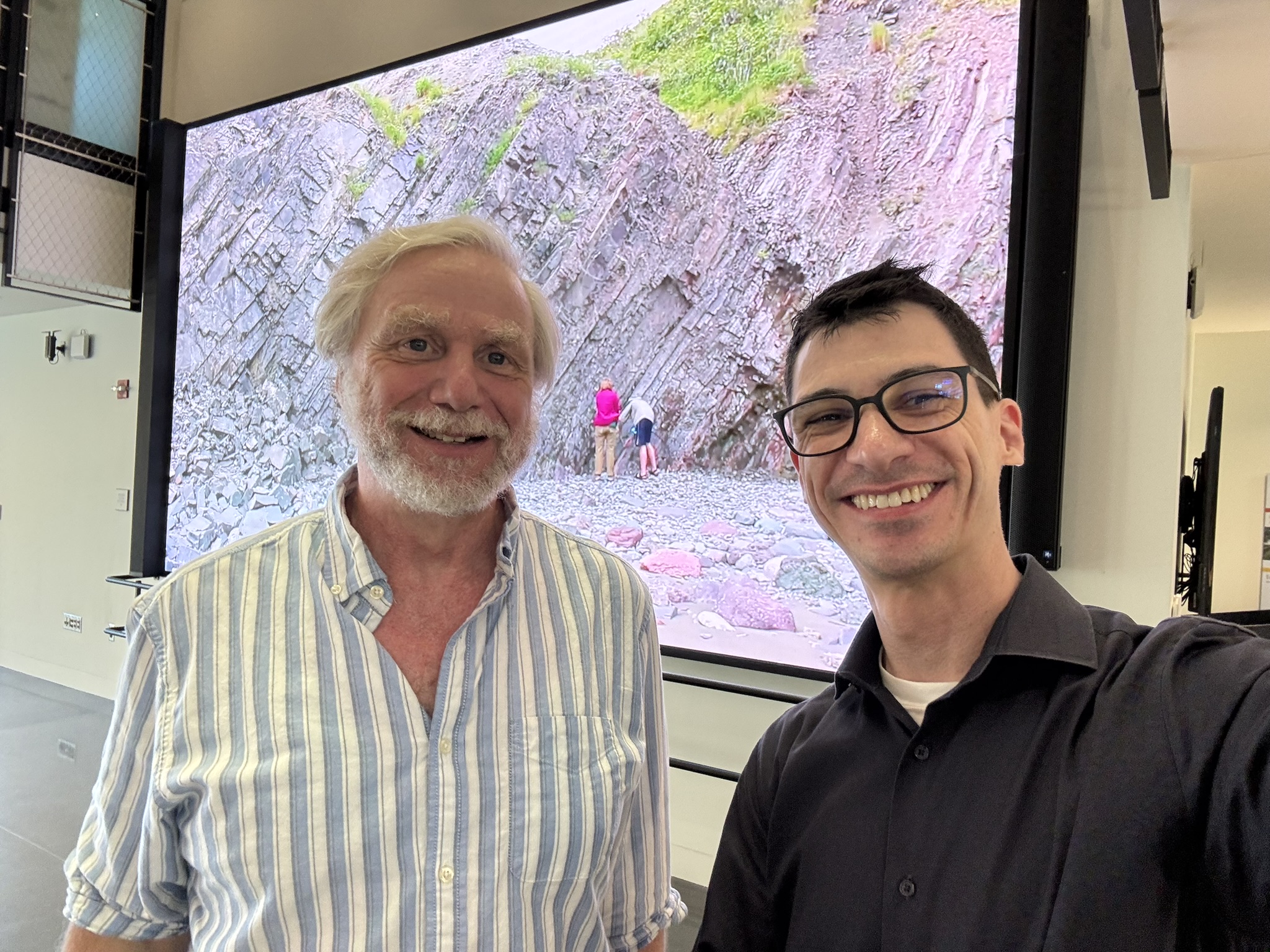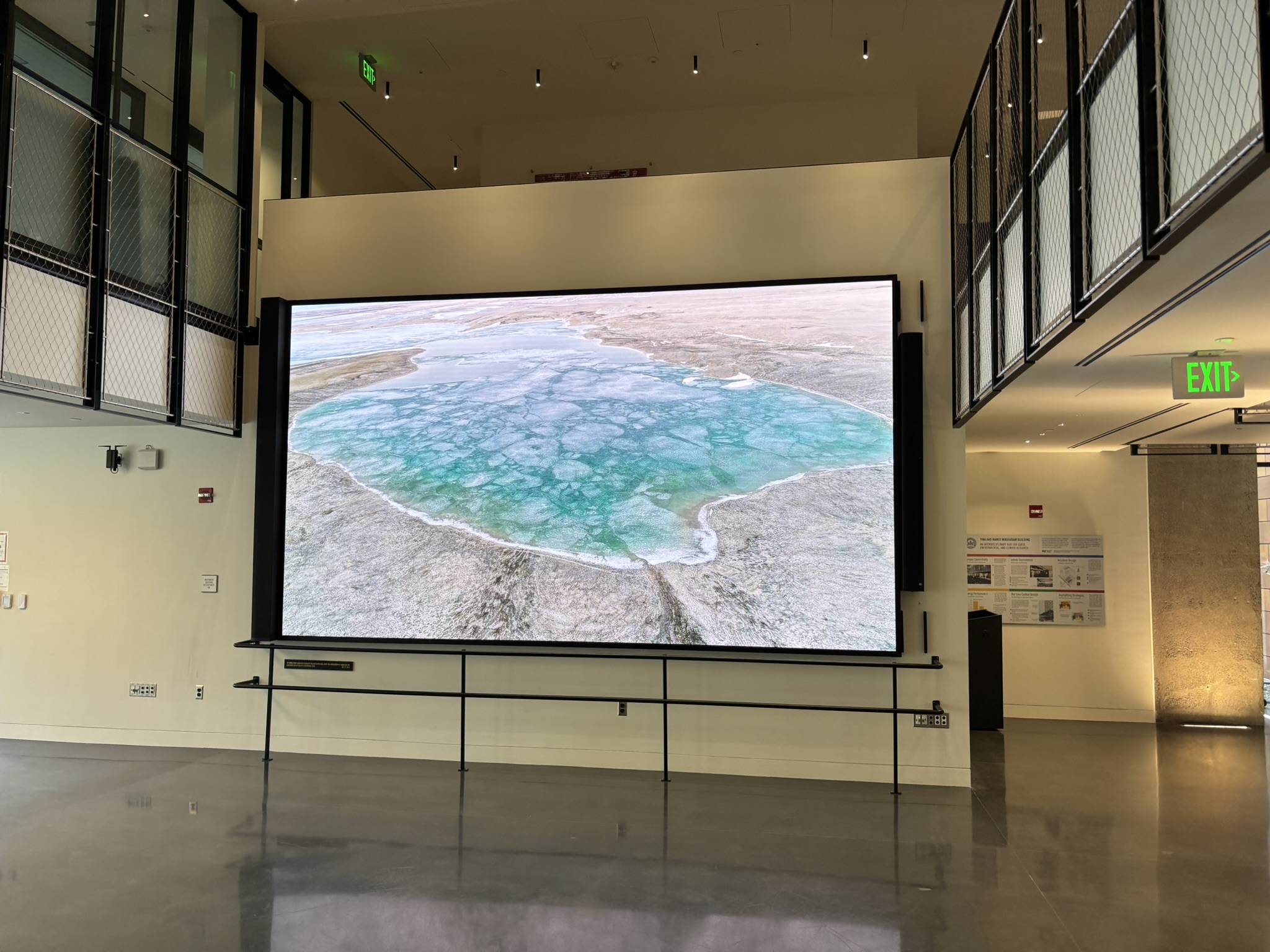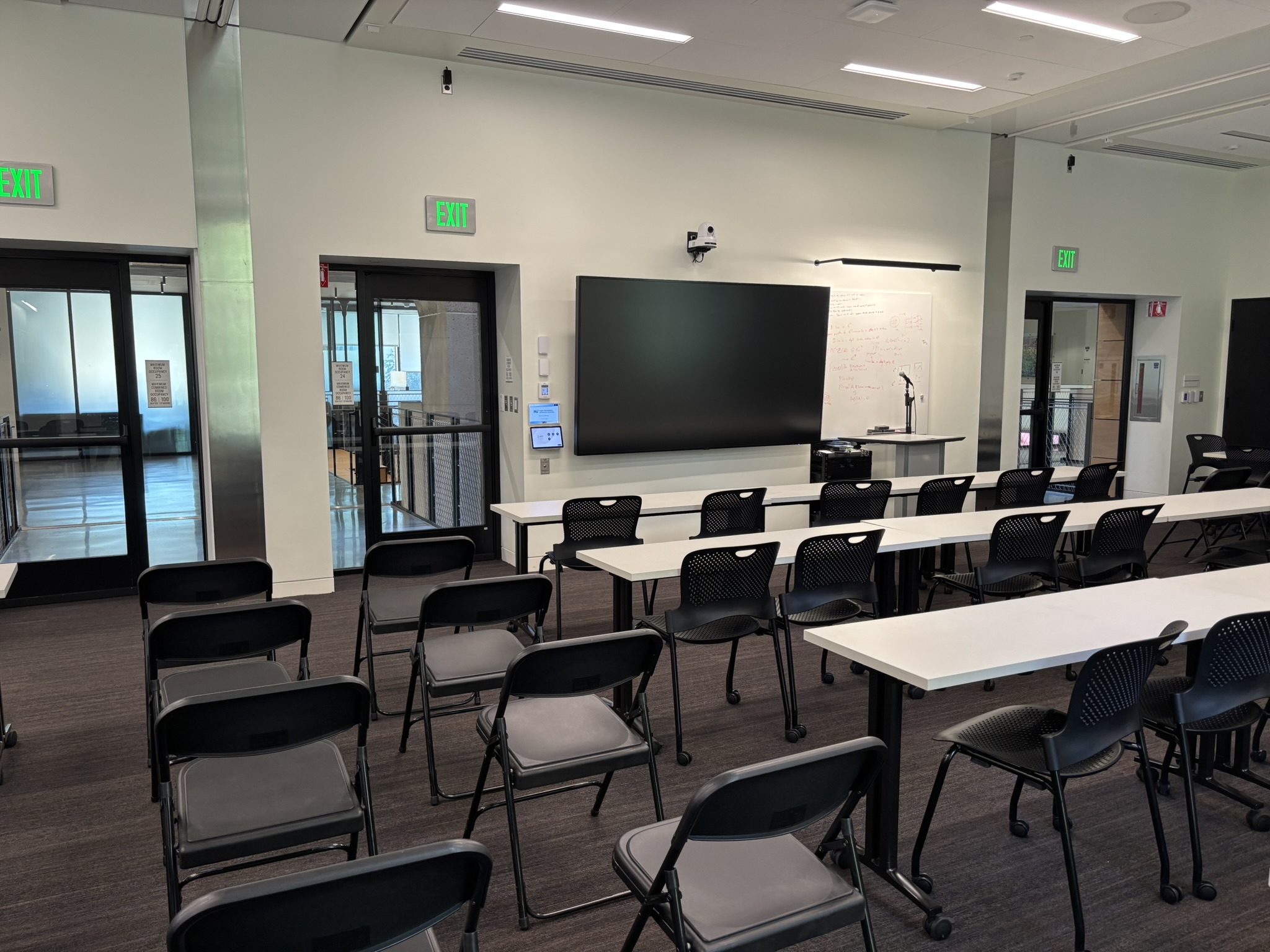Solving Hard Problems, Giving Back: Executive Director Quattrochi to Mentor MIT Students in Terrascope Program
. Posted in News - 0 Comments
By Kimberly Rau, MassLandlords, Inc.
In the spirit of giving back to the community, MassLandlords Executive Director Doug Quattrochi will mentor students participating in the Terrascope program at the Massachusetts Institute of Technology (MIT) this academic year.

MIT Terrascope Associate Director/Senior Lecturer Ari Epstein (left) and MassLandlords Executive Director Doug Quattrochi stand in MIT’s “Green Building” lobby before class. (Image: cc BY-SA 4.0 MassLandlords, Inc.)
First-year students at MIT have the opportunity to join the university’s Terrascope program, an optional learning community that tackles a different real-world issue every year. Quattrochi, who completed a bachelor of science degree at MIT in 2004 and earned a master’s degree in aeronautical and astronautical engineering in 2006, is also a Terrascope alumnus.

This is the lobby of the “green building,” which has a large projection screen that shows high-definition videos of earth systems. (Image: cc BY-SA 4.0 MassLandlords, Inc.)
Terrascope: Taking On the Hardest Problems
Though many first-year university students are barely into legal adulthood, MIT’s view is that shouldn’t stop them from changing the world. Students who participate in Terrascope have a dedicated collaboration space on campus and access to advisors. They take program-specific classes, but without a lot of hand-holding.
“The classes are all very heavily student-driven,” said Ari Epstein, associate director and senior lecturer for Terrascope. “We create a setting where they can learn and support their learning, but we’re not telling them a lot. We’re putting them in a situation where they have to learn a lot.”
Every year, participants are given a different problem to solve, always having something to do with sustainability. Past years’ programs have focused on lithium mining and its impacts on indigenous communities; bringing sustainable, reliable power to underserved areas of Puerto Rico; and increasing agricultural productivity while protecting access to fresh water in Navajo Nation.
As an undergrad, Quattrochi was part of the first Terrascope class. He and his cohort designed a mission to Mars to try to find evidence of past life (the search for life elsewhere sheds light on how fragile Earth systems really are). The program’s focus is on solutions, however imperfect, but students are encouraged not to lose sight of the reason solutions are needed in the first place.
“Every engineering problem is fundamentally a human problem,” Epstein told MassLandlords. “The problem doesn’t exist in a vacuum…there are human beings who need it solved or addressed.”
This year, the class of 2029 is again focusing on Puerto Rico, with the goal of re-imagining the island’s food system in ways that promote food security, public health and sustainability, among other challenges.
In the first half of the year, students in the Terrascope class must examine the problem they’re given and create a website that offers their solutions in as much detail as possible. Students have the freedom to approach the problem in any way they’d like, up to and including rewriting the whole thing if they feel it is necessary. At the end of the fall semester, participants must present their solutions to a panel of true experts – some of them directly involved with whatever issue the students have been handed – and face their questions.
“You want the students to be in a situation where they understand that doing their best makes a big difference, and they’re challenged,” Epstein said. Putting the panelists and students in the same room also allows experts to get a different perspective, and helps students enter the conversation on another level.
In the spring, students have the option to take up to two Terrascope classes, and may choose to go on a field trip that is relevant to the issues they’ve been tackling all year.
The point of Terrascope isn’t just to solve a specific problem. Nor does it necessarily set up students to go into a field directly related to that year’s issue. Instead, Terrascope allows its students to leave the program with important skills that have a lifetime of benefits, including how to work as a team and recognize the value of a diverse array of contributions.
“Most of the students who take our class are not going to continue on this particular topic,” Epstein said. “Some do. We also have students whose lives are shaped not by the topics they studied, but the way they learned to take on a topic. They may not work on food security again, but throughout their lives, they’re going to face open-ended, not very well-defined problems that nobody else has got a solution for yet, where there’s no accepted way of addressing the problem.”

A look at one of the Terrascope classrooms before class starts. (Image: cc BY-SA 4.0 MassLandlords, Inc.)
Leaders Helping Future Leaders
Quattrochi, who says he has been tackling very hard problems for the better part of the past 25 years, said his involvement with his alma mater makes sense, not just as an alumnus but as the executive director of MassLandlords.
“MassLandlords is recognized as a leader in the community, especially for tackling hard problems at the intersection of multiple disciplines, like housing, climate and food,” Quattrochi noted.
MassLandlords’ mission of creating better rental housing extends far past landlording forms and member certification. It is expanded through focuses on housing policy, as well as environmental and safety matters. The new nonprofit Massachusetts Urban Conservancy will use unbuildable urban land to increase crop yields in community gardens and nearby farms, as well as educate residents about the need to preserve nature.
Quattrochi credits his current ability to tackle hard problems in part to his participation in the Terrascope program as an undergrad. MassLandlords has benefitted enormously from this skillset over the years. Here are three recent examples.
Mass Save: Sustainable solutions for environmental justice communities
Mass Save is a real-world example of what Terrascope teaches. Representatives from utilities, the state, housing providers, renter advocates and more, all with diverse perspectives, have to come to agreement on a shared reality and what to do about it. The so-called “split incentive problem” has made it impossible for housing owners and operators to finance decarbonization and utility savings.
As a representative of MassLandlords, Quattrochi holds a non-voting stakeholder seat on the state’s Energy Efficiency Advisory Council Equity Working Group, which influenced Mass Save’s three-year plan, in effect from 2025 to 2027. We focused on expanding Mass Save’s reach to include rental housing and incentivizing landlords to perform energy-efficient upgrades in their units. As a result of Quattrochi’s involvement, Mass Save’s current three-year plan goes a long way toward solving the split-incentive problem. It has a host of expanded benefits for “designated equity communities (DECs),” including full-cost coverage for weatherization, barrier removal and heat pumps for eligible participants.
That portion of the program went live in August 2025. Properties in those DECs that are more than 50% rented can receive 100% of their costs covered. Many DECs started taking enrollments this August; the rest are expected to begin before the end of 2026.
Thanks to the efforts of MassLandlords and other committed advocates, homeowners in Massachusetts now have access to $2.5 billion in funding for decarbonization efforts.
Lead-safe in Massachusetts: We doubled the deleading tax credit
Another example of a complex problem MassLandlords has helped solve is lead pollution. Deleading a rental unit is important. We now know that lead exposure has serious health ramifications for children, and rentals that house children under the age of 6 must be deleaded. Refusing to rent to families with children is unlawful, so deleading is vital.
Deleading is also expensive, especially if windows are involved. For years, the tax credit for deleading sat at $1,500 per unit. In 2023, we proposed An Act to Further Lead Remediation in Rental Housing by Increasing the Deleading Credit. The bill didn’t pass, but in late 2023, it was partly absorbed into legislation signed by Governor Maura Healey. We doubled the deleading credit to $3,000 for full abatement, and $1,500 for interim control. MassLandlords has been a leader in educating housing providers about the need to remediate lead. More than 600 attendees have taken our Crash Course in Landlording, and 2,000 more read our lead materials online annually.
MUC: Saving landowners money and preserving the environment
A final example of our work to solve complex problems can be seen in our recent efforts to prevent loss of nature. In 2024, MassLandlords writer Eric Weld, along with Quattrochi, established the Massachusetts Urban Conservancy, a nonprofit designed to take unbuildable “junk” land and turn it into spaces where native animal, plant and insect species can thrive. As an added bonus, the spaces may be used as outdoor classrooms for children in the area.
“Healthy green spaces are too much a rarity in cities and some towns in our state,” said Weld in a press release announcing MUC’s first fundraiser, established to help acquire a donated plot of land in Randolph.
“Abundant research points out how important trees and nature are to residents’ wellbeing,” Weld continued, “not only for their psychological benefits, which are substantial, but for better air quality, cooler temperatures, and downstream effects like stronger economies and academic performance.”
The benefits to saving the environment are plentiful, but donating unbuildable land to MUC also saves landowners money in property taxes and liability insurance. This is another example of how setting out to solve one set of problems (declining green spaces, an influx of invasive species, lack of outdoor opportunities for children) has benefits far beyond the obvious.
Conclusion
Solving big problems requires thinking outside the box and finding solutions that actually work, instead of relying on what’s already been tried or declaring every public policy a “success” regardless of what the data shows. That’s why we advocate for non-exclusionary zoning and fight the idea that rent control will solve the housing crisis. It’s why MassLandlords pushes for environmentally sound heating and cooling solutions, and why we’re so focused on reaching landlords that are often left out of larger state conversations.
The Terrascope program may never tackle the housing crisis in Massachusetts. Or, one day, perhaps a cohort of students will look at what it takes to decrease rents and make housing attainable for everyone who needs or wants to live near Boston. And who knows? Just as Quattrochi and the MassLandlords team are now making a difference, one of this year’s Terrascope students may repay the mentoring effort in ways we can’t predict. Regardless, the Terrascope view that real people need real solutions is one we can, and do, stand behind.




